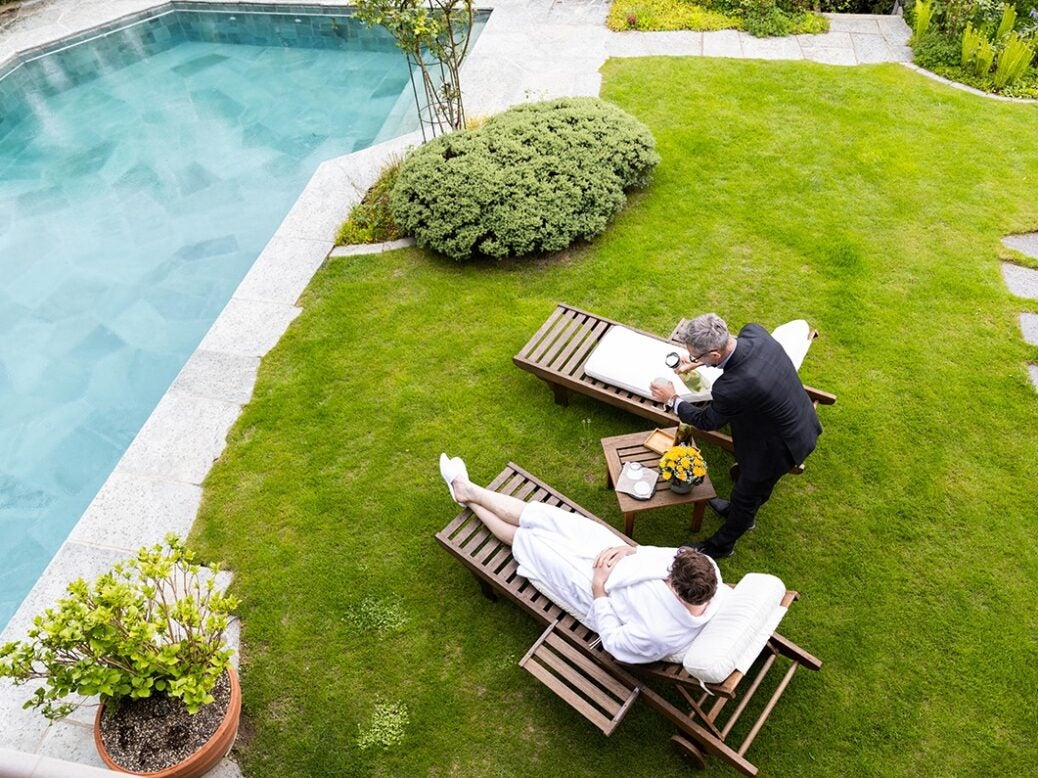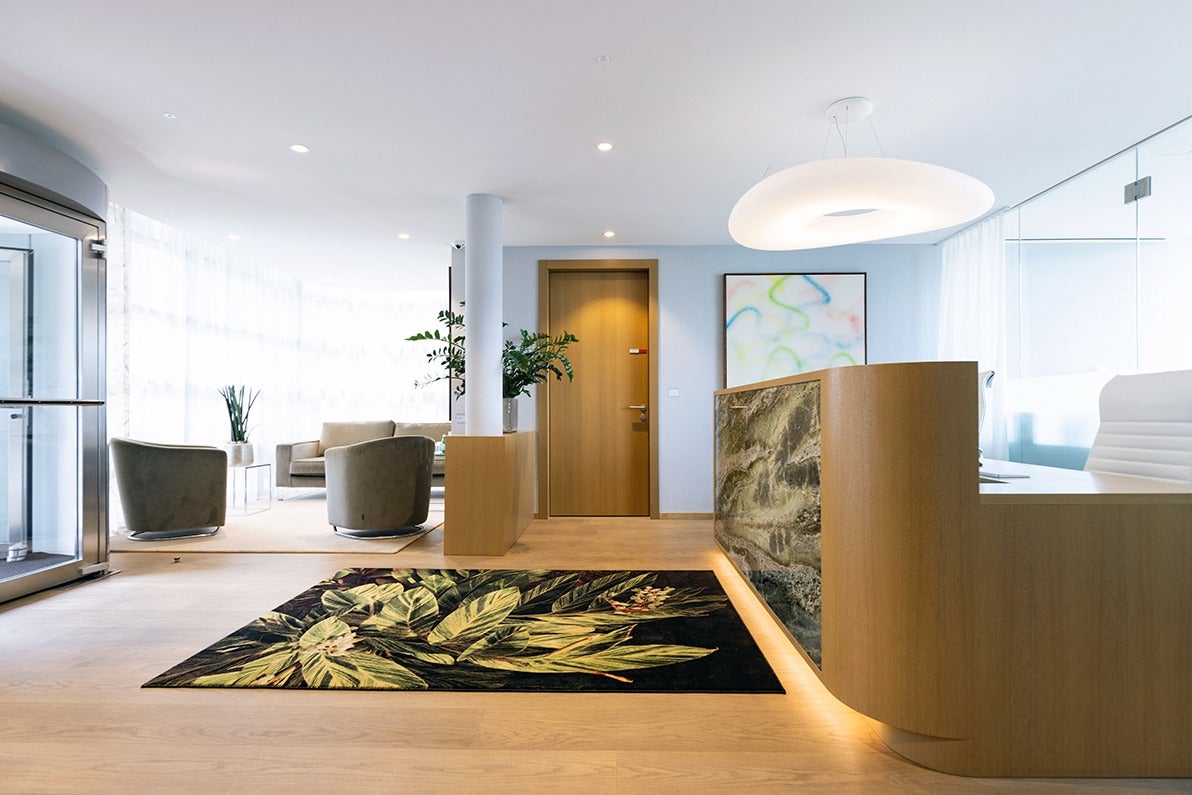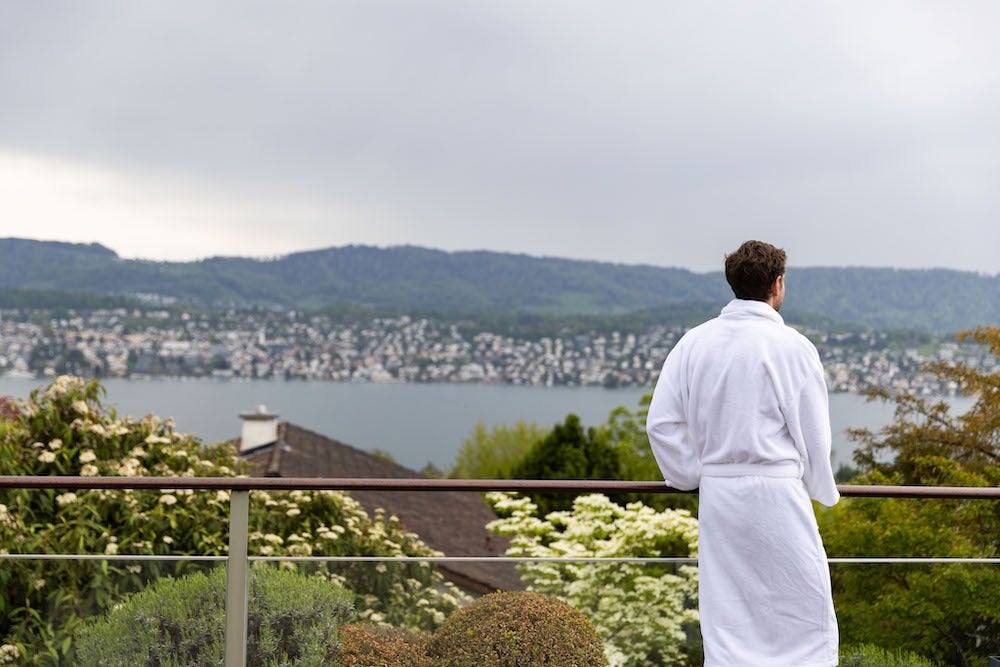
The Kusnacht Practice in Switzerland takes the notion of a high-net-worth health retreat to another level, with a price tag to match
You are seated on a sofa in your private villa on the shores of Lake Zurich. In front of you are panoramic windows, which frame the vast body of water, rolling green hills and several pieces of neighbouring super-prime real estate. But you cannot see any of this: your eyes remain closed.
The room is quiet; your valet and private chef have each retired to their quarters. The only thing you can hear is the dulcet, Spanish-accented voice of your mindfulness coach, Fatima. She is telling you to relax. She does this by encouraging you to focus on one part of your body at a time and release the tension held there.
Together you begin at your toes and work all the way up to your jaw, cheeks and forehead. You feel a tingling sensation as the stress begins to melt away for the first time in what feels like several months.
This is a glimpse of the experience that lies in store for participants of the ‘Leader Retreat’, a new programme specially developed for senior businesspeople by the most expensive luxury treatment centre in the world, the Kusnacht Practice.
Clients here pay up to CHF119,000 (£109,000) per week and generally stay at least a month. George Michael was here for six months in 2015 when he was battling addiction.

Today the Kusnacht Practice is run by CEO Eduardo Greghi. You wouldn’t guess from his dazzling smile, even tan and the flash of a Patek Philippe Nautilus beneath his shirt cuff, but Greghi is the son of a farmer from rural Brazil.
In the private villa, over a dinner of tuna and mango ceviche followed by veal, celeriac purée and white asparagus with hollandaise, he sketches out his itinerant career, which has included a stint working in a pizza restaurant on the Finchley Road in London, as well as spells in Italy and Germany, before he ended up in Switzerland.
It was in Zurich that he met the Canadian psychologist Lowell Monkhouse. Taking inspiration from Carl Jung, who lived nearby until his death in 1961, Monkhouse would take a highly intensive, focused and personal approach to treating patients grappling with addiction, living with them and providing one-on-one treatment for months at a time.
As a result, the treatment was not cheap. Greghi tells me that since he was ‘well connected in Zurich’ he would serve as a sort of fixer for Monkhouse’s wealthy clients – solving ‘small issues’ or ‘connecting them to somebody – a good banker, a multi-family office, or helping them find a plumber on a Sunday’.
Something about the personalised, all-encompassing approach captured Greghi’s imagination. Soon he was studying intervention psychology and attending conferences on addiction treatment – ‘more than I can count’. He saw potential in the business, too, so in 2013 he bought Monkhouse out and began to expand the clinic’s offering, catering to the same super-rich, super-demanding clientele but offering a wider range of care.
There are now 75 full-time employees at the centre, up from 15 in 2015 – although it only tends to take on between six and nine clients at a time.

Controversy at the Kusnacht Practice
The centre has attracted some unwanted attention on occasion. In 2018, The Sunday Times revealed that a British psychiatrist was paid £150,000 following his referral of George Michael to the clinic. At the time the Kusnacht Practice released a statement which pointed out that it had broken no laws, but Greghi tells me it no longer pays commissions. These days everything is geared towards the highest levels of privacy and discretion.
These twin themes extend to the clinic building. Its exterior is completely anonymous, with no signage whatsoever. Inside, patients meet doctors and other staff members in treatment rooms, but they are not admitted back into the corridors or the lobby until it has been checked that the coast is clear – in case two clients come face-to-face and thereby risk being identified. Any treatment that can be provided within the clients’ private residences happens there, in one of the majestic lakeside villas rented by the company.
‘The combination of rigid rules and six-star hospitality could not be more Swiss’
The weekly fee is all-inclusive, covering all tests, meetings and specialist treatments for the duration of a patient’s stay. (The exception to this is any surgery, which can be arranged by the clinic and charged at cost price to the client.) In addition to around 20 members of its treatment team (largely made up of doctors), the practice has a number of complementary therapists on its books, who offer treatments and coaching on everything from acupuncture to public speaking.
The Kusnacht Practice three pillars approach
But every Kusnacht client’s programme is based on three key pillars: medical, psychiatric and ‘biomolecular restoration’, which is related to nutrition and lifestyle.
This is all complemented by two members of staff who live with the client in their villa for the duration of their stay: a counsellor and a private chef. Among the counsellor’s duties is the responsibility of ensuring that the client – who could be at the lowest ebb of addiction, or a high-flying business person in search of an extra one or two per cent performance – keeps to the timetable drawn up for them.
The chef is responsible for preparing meals that make it a pleasure to stick to the dietary principles the clinic insists upon. Refined sugar and carbohydrates are strictly verboten. The emphasis is on protein, fats, plenty of vegetables – and a programme of three meals a day, with no snacking or grazing. ‘We are not a hotel,’ I am told.
This approach – which combines six-star hospitality with rigid rules – could not be more Swiss. It is also doubtless one of the reasons the practice manages to get so many clients back on the straight and narrow.
As I say, there are three key pillars of the Kusnacht approach. One is medical treatment. I meet the head of the department, Dr Georg Schulthess, who conducts an initial consultation with each client, regardless of whether they report existing medical issues. After a battery of tests, he coordinates their medical care, bringing in any specialists that might be required.
Another is psychiatry. Dr László Ürögi explains that the department works with clients’ PAs before they arrive to streamline their schedules and workloads. In an ideal world, patients could disconnect from work totally while undergoing treatment. But having a small, definite window for a limited number of emails or meetings is the next best thing. Problems related to sleep, weight, irritability and not spending enough time with family are ‘most typical of successful businesspeople’, he says. And they are often linked to one another.
A four-step process to ‘managing thoughts and emotions’
This group sometimes shies away from talk of mindfulness and anything they perceive to be fluffy or unscientific, notes Dr Ürögi. ‘But if you talk about it as “managing thoughts and emotions”, then it can be more attractive.’ He gives an example of a ‘tool’ that he might provide to help clients deal with stress in their working lives – a four-step process that one might employ before the start of a meeting.
One: take stock of your goals. What do you want to achieve?
Two: conduct a quick scan of your mental and physical state. How do you feel?
Three: Remind yourself of previous experiences of the same type. Why did some go well and others go badly?
Four: take a moment to connect with the version of yourself that you want to be.
It is the tip of a very large iceberg. But, to me, it sounds rather useful.
The third key pillar is ‘biomolecular restoration’, which is overseen by Dr Antoinette Sarasin, developer of the proprietary ‘BIO-R’ method. She tells me that her department carries out laboratory testing on patients to detect any biochemical or neurochemical imbalances or deficiencies.
This, along with heart-rate variability monitoring, which provides an indication of energy levels and capacity to withstand stress, provides Dr Sarasin’s team with the information required to tell clients their ‘biological age’. They then work to mitigate ‘metabolic stress factors’ through diet, supplements and lifestyle – with a special focus on quality of sleep. I am told that one 36-year-old woman who presented with a biological age of 42 managed to reduce it to 29 over the duration of her stay.
‘Ageing is, by definition, a disease – the mother of all diseases,’ says Dr Sarasin. She offers another starkly simple piece of advice: ‘Sugar is vitality killer number one’.
My stay at the Kusnacht Practice is not long enough to experience the full range of tests and analysis that paying clients receive. I do have time, however, to sample some of the treatments from the complementary therapists who visit my spectacular villa (which has an original drawing by Rembrandt hanging on the wall) to administer everything from osteopathy to acupuncture and even a physical training session involving a futuristic suit that bombards my muscles with electrical impulses. The experience with the suit is unpleasant, but I begin to get a sense of the true overhaul that one could undergo – with a little more time.
Aftercare at the Kusnacht Practice
When you leave the Kusnacht Practice, it isn’t the end. Raluca Babota runs the ‘Continuing Care’ programme, which aims to ensure that changes to a client’s lifestyle persist even after they have left what she describes as ‘the Kusnacht Bubble’. There are daily check-ins for the first month following a stay and many take the option – at CHF20,000 per week – to have the clinic’s live-in counsellor and private chef come to their own home to ease the transition.
‘It doesn’t stop with detox and sobriety,’ says Babota. ‘It’s about creating a dream for yourself of what life could be like.’ Of course, the occasional person returns because they relapse, but plenty of others are on a different trajectory. She tells me about one client who first came to the Kusnacht Practice to deal with addiction but now returns for two weeks each year to focus on a different goal each time – which might be related to health and fitness, relationships or parenting.
Before my stay comes to an end, there is one final reminder of the lengths the practice goes to to protect its clients’ privacy. When I have packed my belongings the private chef, Sven, does a sweep of the villa and its electronic devices for any bits of paper, business cards or Netflix logins that would reveal I had been here. When I depart, in a black Mercedes with tinted windows, I am as anonymous as any of the household names who might have been here before.
More from Spear’s:
This Chelsea clinic’s ‘sci-fi-sounding’ therapies are used by CEOs
Are ‘gong baths’ the solution to our stresses?
Why medispas are taking over the world of wellness







